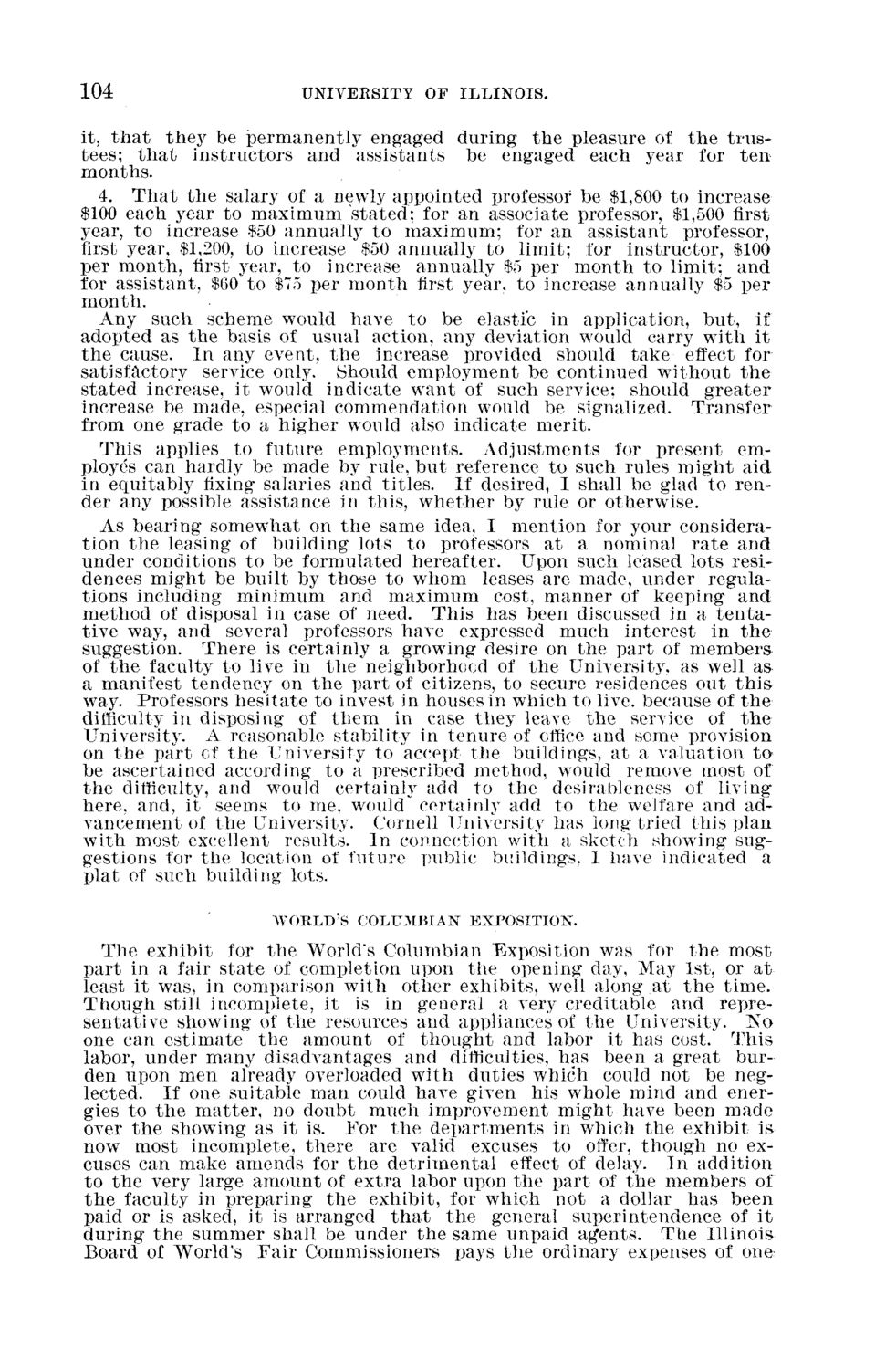| |
| |
Caption: Board of Trustees Minutes - 1894
This is a reduced-resolution page image for fast online browsing.

EXTRACTED TEXT FROM PAGE:
104 UNIVERSITY OF ILLINOIS. it, t h a t they be permanently engaged during the pleasure of the trustees; t h a t instructors and assistants be engaged each year for ten months. 4. T h a t the salary of a newly appointed professor be $1,800 to increase $100 each year to maximum stated; for an associate professor, $1,500 first year, to increase $50 annually to maximum; for an assistant professor, first year, $1,200, to increase $50 annually to limit; for instructor, $100 per month, first year, to increase annually $5 per month to limit; and for assistant, $60 to $75 per month first year, to increase annually $5 per month. Any such scheme would have to be elastic in application, but, if adopted as the basis of usual action, any deviation would carry with it the cause. In any event, the increase provided should take effect for satisfactory service only. Should employment be continued without the stated increase, it would indicate want of such service; should greater increase be made, especial commendation would be signalized. Transfer from one grade to a higher would also indicate merit. This applies to future employments. Adjustments for present employes can hardly be made by rule, but reference to such rules might aid in equitably fixing salaries and titles. If desired, I shall be glad to render any possible assistance in this, whether by rule or otherwise. As bearing somewhat on the same idea, I mention for your consideration the leasing of building lots to professors at a nominal rate and under conditions to be formulated hereafter. Upon such leased lots residences might be built by those to whom leases are made, under regulations including minimum and maximum cost, manner of keeping and method of disposal in case of need. This has been discussed in a tentative way, and several professors have expressed much interest in the suggestion. There is certainly a growing desire on the part of members of the faculty to live in the neighborhocd of the University, as well as a manifest tendency on the part of citizens, to secure residences out t h i s way. Professors hesitate to invest in houses in which to live, because of the difficulty in disposing of them in case they leave the service of t h e University. A reasonable stability in tenure of office and some provision on the part cf the University to accept the buildings, at a valuation to* be ascertained according to a prescribed method, would remove most of the difficulty, and would certainly acid to the desirableness of living here, and, it seems to me, would" certainly add to the welfare and advancement of the University. Cornell University has long tried this plan with most excellent results. In connection with a sketch showing suggestions for the location of future public buildings, I have indicated a plat of such building lots. WORLD'S COLUMBIAN EXPOSITION. The exhibit for the World's Columbian Exposition was for the most part in a fair state of completion upon the opening day, May 1st, or at least it was, in comparison with other exhibits, well along at t h e time. Though still incomplete, it is in general a very creditable and representative showing of the resources and appliances of the University. No one can estimate the amount of thought and labor it has cost. This labor, under many disadvantages and difficulties, has been a great burden upon men already overloaded with duties which could not be neglected. If one suitable man could have given his whole mind and energies to t h e matter, no doubt much improvement might have been made over t h e showing as it is. For the departments in which the exhibit is now most incomplete, there are valid excuses to offer, though no excuses can make amends for t h e detrimental effect of delay. In addition to the very large amount of extra labor upon the part of the members of t h e faculty in preparing the exhibit, for which not a dollar has been paid or is asked, it is arranged t h a t the general superintendence of it during the summer shall be under the same unpaid agents. The Illinois Board of World's Fair Commissioners pays the ordinary expenses of one
| |